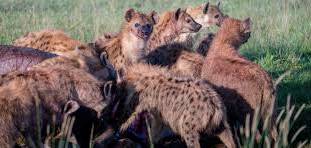
- Inequality is a threat to our social fabric, but it’s not just a human problem.
- A new study shows the animal kingdom is riven by privilege and inequality.
- For some species, being on the wrong side of the divide is a matter of life and death.
Inequality is not confined to humans, a new study reveals. Mammals, fish, birds and even insects have been shown to benefit from inherited wealth and abilities.
Researchers have discovered the intergenerational transfer of wealth and resources affects many living creatures. Some have a better quality of life than other members of the same species - including access to food and shelter - just because of their parents’ status.
Published in the Journal of Behavioural Ecology in December 2021, the study found that some species of red squirrel, for example, pass their stores of nuts and pinecones on to their offspring, giving them a built-in fitness advantage in adult life and down the generations.
 Look at me Dad: some grouse gain a mating advantage if their father is still living. Image: Pixabay/Jayne Simmons
Look at me Dad: some grouse gain a mating advantage if their father is still living. Image: Pixabay/Jayne Simmons
For some species of Grouse, success in mating can depend on paternal influence. When their fathers are nearby, young males gain prime position in courtship displays, giving them a much better chance of passing on their genes than those without a living father.
Spotted hyenas inherit their rank in the pack from their mothers and these high-status families tend to be larger and outlive other families. Individual females often join to defend shared territory, with the highest born having the most access to resources.
Even underwater, rank and privilege persist, the study reveals. Individual clownfish inherit the right to hide in large sea anemones. This ensures them better protection from predators than those without such a birthright.
In the insect world, some female wasps inherit their nests from their parents which means they are more likely to produce offspring than less privileged “lone” females who are denied access to the nest.
Parental toolkits
According to the study, chimpanzees and Capuchin monkeys inherit more than status. Their parents have been shown to pass on tools for cracking nuts. This not only means they have better access to food, but they can then also pass on knowledge about how to use tools to their offspring.
Wealth inequality exists in many animal species. Image: Behavioural Ecology
“Cultural and historical factors shape the expression of privilege in human societies,” the authors say. “Yet, parallels exist in how privilege emerges in both human and animal societies.
“In animal societies, wealth comes in the form of transgenerational effects of parental care or social networks, but also the direct transfer of material wealth,” they add.
The study comes as the latest edition of the World Inequality Report reveals inequality is widening in the human world and the COVID-19 pandemic has made the situation worse across the globe.
Extreme inequality
“In 2021, after three decades of trade and financial globalization, global inequalities remain extremely pronounced: they are about as great today as they were at the peak of Western imperialism in the early 20th century,” the report says.
“In addition, the Covid pandemic has exacerbated even more global inequalities. More generally speaking, wealth inequality remains at extreme levels in all regions.”
The Middle East and North Africa is the most unequal region in the world, according to the report, while Europe has the lowest inequality levels. It says that, across the world, the rich have become richer, widening the wealth gap with those who are less well-off.
While the top 1% of the wealthiest people own 38% of all wealth created since the mid-1990s, the poorest 50% of people have gained just 2% of it. The problem is exacerbated by gender inequalities, and progress to close the gender gap is too slow, the report adds.
The World Economic Forum’s Global Social Mobility Report 2020 highlights that while globalization and the Fourth Industrial Revolution have generated great benefits to society, raising the living standards of billions and lifting millions out of poverty, inequality is rising.
According to the report, the effects of inequality are eroding the social fabric and undermining political processes, so it’s vital action is taken to increase social mobility and create opportunities for everyone in society.
Author
Douglas Broom, Senior Writer, Formative Content
Posted on 2022-02-08 16:47









Comments